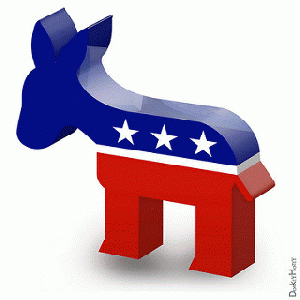
Super Delegates will be picking the Democratic Party presidential nominee.
(Image by DonkeyHotey) Details DMCA
Crunching the numbers after the Wisconsin Democratic primary April 5, I made a startling discovery.
Neither Bernie Sanders nor Hillary Clinton can win the Democratic Party's nomination this year on pledged delegates alone. The convention will be a contested one, and the super-delegates will be making the final decision.
Here are the facts.
In the 21 contests coming up between now and June 14, 1,661 pledged delegates are still up for grabs. Currently, Hillary Clinton has accrued 1,302 pledged delegates, to Bernie Sanders' 1,088. Hillary has 474 super-delegates in her column, while Bernie has 32. (At this point, 208 other super-delegates have not taken sides.)
A total of 2,383 delegates, pledged and super, are needed to win the nomination.
I put together a spreadsheet, giving conservative percentage wins to each upcoming contest. I put Bernie winning Oregon, Guam, Virgin Islands and Montana with 60% of the vote, Sanders winning nine other states with 55% of the vote, tying Hillary in the delegate-rich states of New York, Connecticut, Pennsylvania, Puerto Rico and New Mexico, and losing in Delaware (40%) and DC (45%). Average percentage for Sanders came to 53%.
The bottom lines showed that, under this scenario, after all votes were cast, Bernie Sanders would have 1,969 pledged delegates. Adding his 32 super-delegates (so far) makes his total 2,001, not enough for the nomination.
Hillary's numbers are interesting, both in the bottom line and in how they progress over time. At the conclusion of the voting, with my projections, she would end up with 2,082 pledged delegates, also not enough for the nomination on pledged delegates alone.
But, surprisingly, her 474 pledged delegates, numerous though they are, would not get her to the magic number until after California, New Jersey, Montana, New Mexico and North Dakota vote on June 7.
And being super-delegate votes, Hillary can't count them for real until they are actually voted at the convention.
But then I tried other scenarios with my spreadsheet. What if our two candidates simply split all the upcoming votes 50-50? Bernie would end up with 1,919 pledged delegates, Hillary with 2,132, still not enough for either one to win the nomination outright.
How about if the momentum suddenly shifted and Hillary started to win 60-40? She would have 2,298 pledged delegates to Bernie's 1,753, still not enough to win. And even in this very unlikely scenario, Hillary's super-delegates still would not put her over the top, on paper, until after the June 7 vote is in the history books.
Although super-delegates make promises to candidates, they
don't actually cast their votes until the convention. If going forward, as I
very conservatively predict, Bernie racks up 14 solid wins, five ties in big
delegate-rich states, and only two small losses, the pressure will be on.
Given that situation, stepping back and looking at the overall dynamic, the 714 super-delegates who will be picking the Democratic Party nominee should consider several critical facts:
1. Hillary Clinton has earned a third of her pledged delegates (437) in the Deep South. Those delegates are essential for her nomination, but winning those states is totally irrelevant to winning the White House. None of those eight Deep South states (Alabama, Arkansas, Louisiana, Texas, Georgia, Tennessee, Mississippi, South Carolina) will vote to send ANY Democrat to the White House in November.
2. A full 75% of the vote differential that Hillary touts ("more people have voted for me") comes from those eight Deep South states. Of the 2,240,000 vote differential (down from a high of 2.6 million) 1,697,216 of them were Deep South votes. In the remaining states, the vote differential is down to about half a million, and closing fast (Bernie won 135,000 more votes than Hillary in Wisconsin).
(Note: You can view every article as one long page if you sign up as an Advocate Member, or higher).





